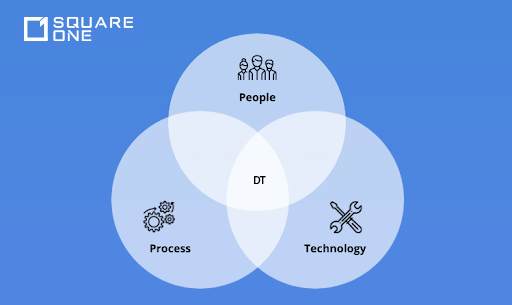
Beyond technology, digital transformation is a cultural shift that challenges legacy business models and invites innovation at every level. Discover its enduring impact through this guide on digital transformation (DT).

What is Digital Transformation?
Digital transformation is a pivotal integration that harnesses modern digital technologies to either create new or modify existing fundamental business processes to streamline operations and deliver value to customers.
By transcending the conventional approach to operations, sales, marketing and customer service, digital transformation unlocks new avenues for innovation and efficiency, reshaping every aspect of how businesses operate and compete in the global marketplace. Amit Zavery, VP and Head of Platform, Google Cloud, perfectly encapsulates the vision beyond digital transformation. He says, “Consider digital transformation not merely as a technology project that needs to be completed but as an ongoing journey that constantly adapts to meet the evolving challenges of customer demands.”
Any digital transformation should consist of a framework that addresses a problem statement, finds an opportunity that can be leveraged for growth and outlines a strategy for deploying technological solutions that accelerate innovation, drive efficiency, and assist in thriving in competitive markets. By embracing intelligent applications through digital transformation, businesses can strategically court long-term success.
Why Implement Digital Transformation for your Business?
Now, does implementing digital transformation in your business make a difference? Here are a few compelling reasons why your business should undergo a digital transformation.
- Digital transformation enhances the customer experience by leveraging data analytics and digital tools to gain insights into customer behaviour, leading to personalized customer engagement.
- By automating business processes and utilizing advanced digital technologies, businesses can streamline operations, reduce manual tasks and improve overall efficiency.
- Through digital transformation, businesses can encourage innovation and explore business models and solutions that can empower their posture in competitive markets.
- Business leaders will have access to data-driven decision-making tools such as real-time analytics and predictive insights to meet customer demands and seize new opportunities through digital transformation.
- With guidance from expert digital transformation consulting services, businesses can effectively deploy inventive solutions that can open up revenue opportunities, enabling them to tap into new markets.
What is the Process of Digital Transformation?

With the key motivations for digital transformation in mind, let’s discern the process involved in strategic implementation.
Define your Purpose: The first step in the pursuit of digital transformation is to figure out the core reasons behind implementation. This can be either to elevate customer experience, improve efficiency or foster innovation. Clearly defining your purpose will effectively guide the entire transformation journey. We recommend that you assess your transformation needs through seasoned digital transformation consulting services tailored to your organization’s unique needs and opportunities.
Assess your Current State: The next step is to evaluate your current technological infrastructure, business processes and core capabilities. This approach assists in identifying gaps between your current standing and your aspiration for transformational goals by integrating technology, people, and processes effectively.
Set Clear Objectives: After assessment and evaluation, set clear objectives. Here’s a technique to do so: set objectives that are Specific, Measurable, Achievable, Relevant and Timebound (SMART). Make sure they align with your overall business goals and are pragmatic, ensuring they drive progress and provide a clear direction for your digital transformation journey.
Embrace a Digital Culture: Digital transformation is not just about shifting to advanced technology; it is also about changing mindsets and fostering a culture that promotes innovation, collaboration, agility, and continuous learning. Thus, imparting these core values to your team cultivates a dynamic learning ecosystem that is conducive to growth and innovation.
Leverage the Right Technology: One of the most crucial steps in the process is to identify and implement technologies that are in sync with your objectives. For instance, if your goal is to transition to paperless operations, leveraging technology like electronic document management can facilitate a seamless transition with optimized efficiency, streamlined document storage, and retrieval while reducing overall costs.
With the assistance of digital transformation companies, your businesses can navigate the complexities of choosing the right tech stack that is pivotal in driving excellence, be it AI, big data, machine learning, etc.
Focus on the Customer Experience: The next step is to prioritize the customer experience as one of the main strategies for digital transformation. Utilizing the right technology to understand and enhance the customer journey addresses the evolving expectations of customers and facilitates a personalized, enhanced experience, which is a key driver for digital transformation.
Optimize Operations: After sorting through all the nitty gritty details, it’s time to implement digital solutions to your processes. This may involve automating processes, adopting new methodologies, or reengineering existing operations to streamline operations, enhance efficiency and cut costs.
Ensure Continuous Learning and Adaptation: Digital transformation is not an endpoint, but an ongoing process. Therefore, once the deployment is complete, the team should constantly strive to improve the operations through continuous learning and feedback. Keeping pace with emerging trends and technologies will assist businesses in effectively achieving their goals of digital transformation.
Measuring the Impact of Digital Transformation
Evaluating the impact of digital transformation is critical for understanding its effectiveness. This assessment acts as a future guiding strategy. Here are key areas where the transformation’s impact can be quantified.
Improved Customer Satisfaction: The main end goal of digital transformation is to improve customer satisfaction through enhanced experiences, personalized interactions, seamless delivery and elevated product quality. Measuring the impact of digital transformation through metrics like Customer Satisfaction Scores or CSAT, Net Promoter Score (NPS), and customer retention rate clearly provides a report on the transformation initiatives and their effectiveness in achieving this objective.
Operational Efficiency: Through transformation initiatives, businesses optimize operations, significantly reducing the costs and time of various business activities. Leveraging Key Performance Indicators (KPIs) such as operational costs, process time, delivery time, and error rates can offer a thorough indication of improvement.
Revenue Growth: Sales growth is certainly another indicator to measure the impact of digital transformation, especially if revenue growth is one of the core objectives. Assessing market share expansion, measuring product demand, and evaluating financial performance in comparison to forecast values offers insights into revenue growth resulting from embracing digital transformation.
Employee Empowerment: Through transformation initiatives, the workforce can be equipped with digital tools that lead to higher productivity and decision-making capabilities, which results in increased job satisfaction. To measure this, businesses can leverage metrics such as employee productivity rates, engagement scores, turnover rates and retention rates.
Key Trends in Digital Transformation
Finally, as we lay all the groundwork for the implementation of transformation initiatives, let’s briefly discern some essential trends in digital transformation.
- Driving Transformation with AI and Machine Learning: Today, customers see efficiency, agility and personalization as imperatives that drive business excellence. Therefore, businesses are increasingly leveraging AI and machine learning as part of their digital transformation strategy to deliver solutions.
At the forefront of transformation, AI and ML’s application is as follows:
- Automates manual tasks to save time and money.
- Assists in data-driven decisions by identifying patterns, market trends and key insights.
- Analyzes customer behaviour and data for creating tailored experiences.
- Improves customer support and service journey.
- The Rise of Low-Code/No-Code: Working to democratize technology, low-code/no-code platforms have gained significant prominence in application modernization. Empowering businesses to develop scalable applications without extensive coding knowledge, low-code platforms are ideal for developing applications that are efficient, adaptable, and rapidly deployable. Low-code platforms, with their user-friendly features, are critical to digital transformation, allowing businesses to accelerate operations and drive innovation.
- Increasing Use of Cloud Computing: As one of the key pillars of modern operations, cloud computing facilitates access to digital solutions that are efficient, agile and scalable. According to reports from McKinsey, most companies will direct 80% of their IT budget towards the cloud by the end of 2024.
Businesses seeking digital transformation consulting can optimize cloud computing to drive innovation and improve operations in the cloud environment. By migrating from on-premise infrastructure to the cloud, businesses can seamlessly integrate various digital solutions, thereby enabling a comprehensive digital transformation. - Keen Priority on Cybersecurity: As the digital footprint of businesses rapidly increases, it opens doors for various cyber threats. With increasing cyber-attacks recorded globally, organizations are prioritizing cybersecurity for their digital operations. Using advanced digital solutions like AI and ML to mitigate cybersecurity threats, businesses are ensuring a proactive approach to threat detection and response.
With compliance requirements and security challenges increasingly becoming more complex, organizations are turning to advanced digital solutions for:
- Reducing risks and attacks
- Monitoring suspicious access
- Protect business assets and data
Get Started with Digital Transformation from SquareOne Technologies
As companies get on the train of digital transformation, implementing an effective strategy that promises practical results can be challenging. As one of the leading digital transformation companies in UAE, SquareOne Technologies expertise accelerates digital transformation, guiding businesses towards success in today’s dynamic digital landscape. With seasoned expertise in driving transformation, SquareOne Technologies offers digital transformation consulting services, primarily in:
- Data and AI
- Enterprise Management Systems
- Intelligent Automation
- Application Modernization
Take the next step in your journey towards digital transformation with SquareOne today and propel your business into the future.
Connect with SquareOne Technologies experts to learn more about solutions.
FAQ’s
Businesses globally are undergoing digital transformation to stay abreast with ongoing trends, meet evolving customer expectations, stay competitive, and improve operational efficiency. In order to achieve sustainable growth and embrace innovations, businesses are capitalizing on emerging technologies to streamline operations and enhance the customer experience.
Some prevalent examples of digital transformation include:
⦁ Cloud-based solutions to optimize operations and improve scalability
⦁ Adoption of AI and ML for data analytics and decision-making
⦁ Leveraging IoT devices for real-time monitoring and automation
⦁ Digitizing customer services with chatbots and virtual agents
⦁ Utilizing smart technologies for predictive maintenance
As one of the seasoned digital transformation companies in UAE, SquareOne Technology facilitates your digital transformation journey by providing expert guidance, strategic consulting, and technological implementation tailored to your organization’s specific needs and objectives. From assisting with optimizing processes, leveraging data & AI, and modernizing applications, SquareOne is here to support you at every stage of your transformation journey.

















